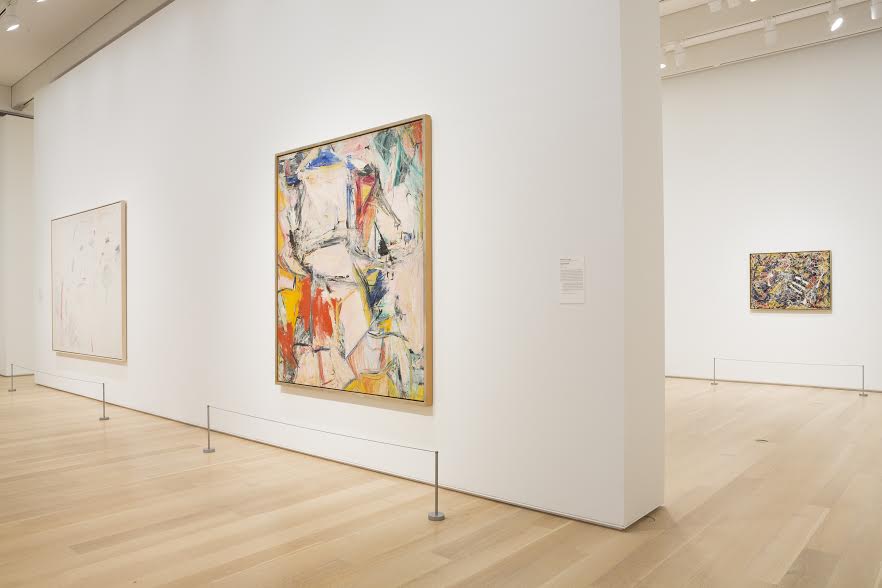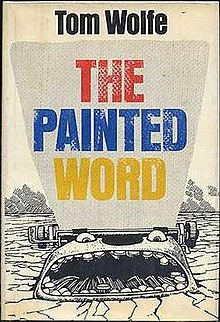Andy Warhol’s work is drawing crowds to the Art Institute of Chicago, and so my companion and I chose instead to spend our visit strolling through other exhibits. We found the modern wing less crowded allowing us ample space to view and openly discuss the mix of media and various artists’ work. In front of a series of Willem de Kooning paintings, the conversation about personal preferences began to unravel. Why?

One, I had never really questioned the basis of my art preferences. How much does visceral emotion get mediated if at all through formal study of the artist, their methods and their portfolio? Does this learning lead to a deeper, fuller intellectually connected appreciation of the artist and their work? Each of us acknowledged the absence of formal classroom-style dedication to Art, that was offset by numerous informal hours viewing the work of artists and assimilating information from reviews or curated comments.

Two, my companion mentioned Tom Wolfes famous critique The Painted Word, a work unknown to me. His reference and corresponding relay of the work’s implication made me feel uninformed, uncomfortable. I think of myself of having an informed appreciation. In that moment his comments challenged both my sensibilities and self-confidence in what I know as it informs my preferences. Ouch!
“Wolfe’s language is revealing. His frenzied prose is effective. Repetition, assonance and alliteration impel language into generalized meaning. The specific is not heard, only a sound—and the sound of The Painted Word combines the tones of propaganda with the promises of religious conversion.”
Though I know of Tom Wolfe’s published work, I’ve only read BonFire of the Vanities and wasn’t mesmerized.
In addition, I was reminded that Wolfe aroused controversy in almost everything he wrote. In searching for The painted Word, I found an ArtNews reprint of Judith Golding’s 1975 book review of Wolfe’s art world critique.
Golding’s read of Wolfe, illustrates something a colleague, Jim McGee recently brought to my awareness that I now realize explains my discomfort with my own poor organization of my acquired knowledge. The generalized meaning of things is hard to attribute and thus difficult to separate from belief. Not everything we know is stable.
Allow me to separate What from How.
What is a label an assigned identity and/or category. How is the manner or state of something, it can also describe a process or development. The why–the inspiration or cause that results in something or someone’s observed manner or state may not always be clear nor is it necessary to know.
Generalized meaning, or general comprehension turn out to be critical building blocks of further knowledge and yet I’m not alone in my failure to actively manage how I build knowledge. So I share Jim’s concern that without managing our knowledge we may miss opportunity to both improve our ability to use and even expand our knowledge.
Coincidentally, according to Golding, Wolfe’s argument with modern art is “based on fear, on the premise that what you don’t know can hurt you.” I can identify with Golding’s frustrations and well illustrated by her provocative prose below.
“Like the audience, Wolfe is bewildered by modern art. “All these years I, like so many others,” Wolfe writes, “had stood in front of a thousand, two thousand, God-knows-how-many thousand Pollocks, de Koonings, Newmans, Nolands, Rothkos . . . waiting, waiting forever for . . . it . . . for it to come into focus, namely, the visual reward (for so much effort) which must be there . . . waiting for something to radiate directly from the paintings. . . .” Wolfe repeats words and stretches out sentences until they engulf the reader. His wait for enlightenment is interminable. And as he waits, the reader waits, feeling the writer’s dilemma, the unbearable angst fo being a philistine, of having tried and failed. The craft of the language might earn a certain respect if Wolfe had succeeded in being either satiric or enlightening. But the message delivered is at best prosaic. Look, he says into the darkness of the readers’ world, you were right all along; you are not missing anything. There is nothing on that blank canvas but blankness.
…Because he reduces concepts to absurdly simple forms, he is understandably attracted to statements which explain complicated or unknown situations and are, therefore, compressed to read with maximum clarity.
ArtNews reprint of Judith Golding’s 1975 book review
Golding complains that Wolfe, the trained journalist, cherrypicks his quotes and even misleads his readers by inserting lines as props in his battle cry against the alchemy of what makes modern art.
In 2020, this same mindless faith as it attaches to much of what we value makes me fearful. Our personal failing to actively manage and curate knowledge drains our power and enables Facebook, Google and Amazon to assume dominant positions as the world’s knowledge brokers.
The esteemed art Critic Steinberg expressed that: “All important art, at least since the Trecento, is preoccupied with self-criticism. Whatever else it may be about, all art is about art. All original art searches its limits. . . .”
The personal benefits of Cultivation
Social media and its glib clips, and sloppy clippings of quotes may be a form of curation but falls short of cultivation. Sure there’s process but what is the quality or associated knowledge building advantage? Too often the process is mechanical, the cut and paste with evaluation neglected. Hard to search or push when time and context are in short supply. The result the provocations others easily share erects rather than pushes boundaries of our knowledge.
In the hands of the gifted journalist/author we don’t necessarily get more. Wolfe skillfully reduces concepts to absurdly simple forms. I fear I’m no different in my attraction to statements I sense and/or believe explain complicated or unknown situations. How much can I absorb or assimilate if I too engage with a painted work for the average of less than 3 seconds, or skim the news that’s been compressed for access on my mobile device?
I’m closing with another quote from Golding as I find the metaphor instructive to the challenges of managing the what and how to grow or update my knowledge. Will you join Jim and I on this journey to be our own artists and invent a new order, or at the least begin the dialogue?
“Modern art is unchartable, risky to make and hard to look at. That is why it produces anxiety. But the ultimate value of today’s art is a decision of the future. Art is antithetical to Wolfe’s view of the world. Artists invent a new order.”
